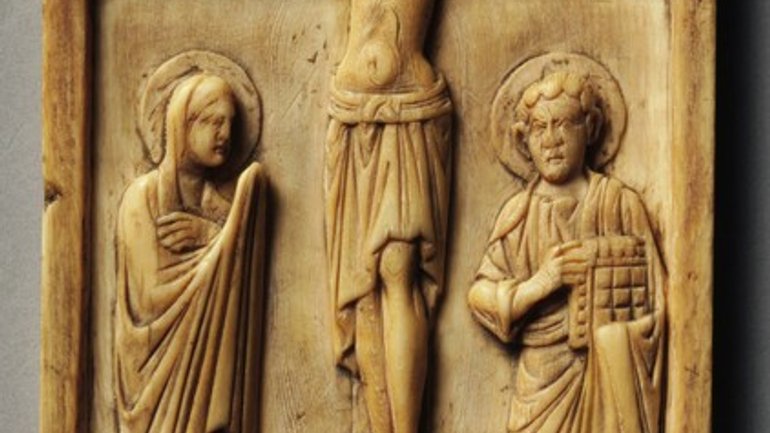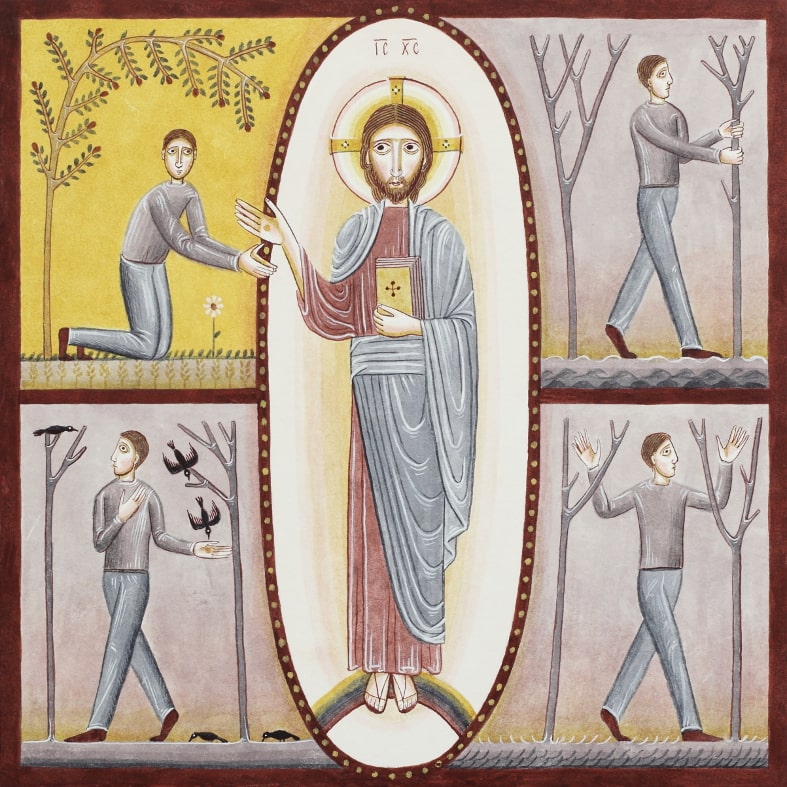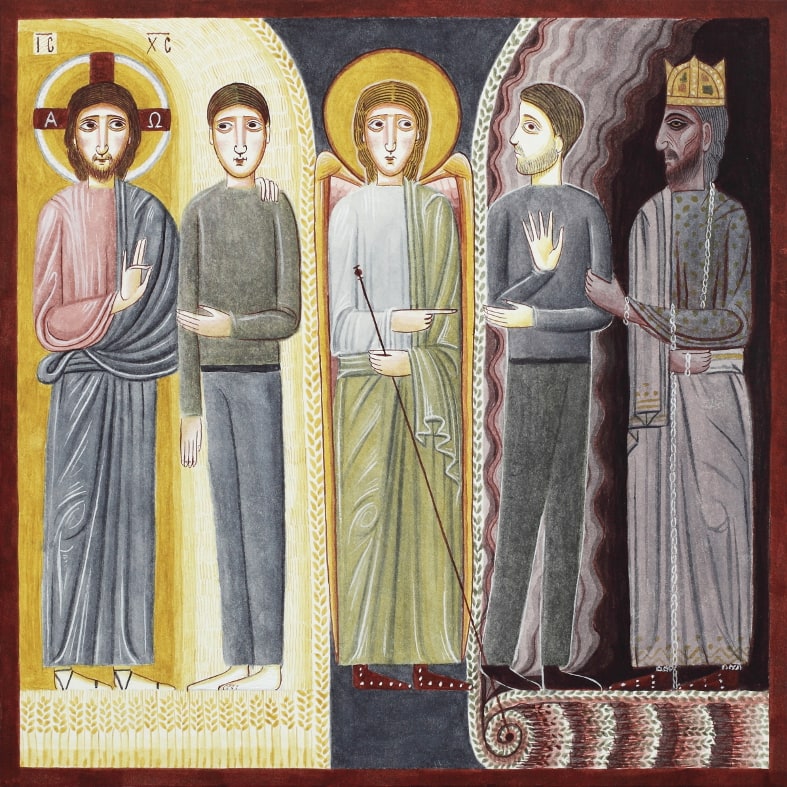

The retreats were written in English and delivered in Ukrainian and English on Zhyve TV at the conclusion of the prayer service at 12:00 at the Patriarchal Sobor of the Resurrection of Christ in Kyiv. Special thanks to Presvytera Olenka Galadza, Fr. Roman Rytsar, and Maksym Tymo for their help with suggestions and correction of the Ukrainain text. This is a draft text for the moment, so please be aware of that when reading and if sharing. All comments and corrections are welcome. May God bless you during this time of Great Lent and pandemic!
Monday 23 March 2020
Holy Martyr Codratus and those with him (10 March)
Isaiah 14:24–32, Genesis 8:21–9:7, Proverbs 11:19–12:6
Today we are confronted by a paradox: we live in an age of great technological advances, enormous wealth, and global networks that allow for travel and almost instantaneous communication between the four corners of the earth, yet we as humans are stopped, made sick, and even being killed by a virus that is smaller than a single hair on our head.
Despite our profound knowledge in an age of information overabundance and even overload, we do not know the precise facts of how many people have contracted the illness, where it has spread, or how exactly it can be stopped.
Despite the great power that our governments have and the militaries they command, they are powerless in the face of an enemy that is invisible and is within us.
Such assertions, which each of us gathers these days from reading the news on the internet or in a newspaper, watching television, or following social media, leave us with confusion, fear, and even panic. Perhaps the more so because if we look out the window, we see a world that is beautiful, nature that is calm and tranquil, trees and flowers that in much of the world are preparing to blossom forth with new life in anticipation of spring.
Within us there is confusion and fear of death, but outside there is beauty and new life. What a paradox!

For a Christian, however, such a paradox is nothing new — and nothing to fear. In fact, paradox is at the heart of our faith. We worship the Son of God, begotten of the Father before all ages yet born of a Virgin in the flesh two thousand years ago; He hung the earth upon the waters in the creation of the world, but He was himself hung on the cross; He is the King of angels, but He was crowned with thorns; He wraps heaven in clouds, but He was wrapped in a purple garment of mockery (cf. Antiphon 15, Matins of Holy Friday). What a paradox!
This paradox that affects the world is also affecting the life of the Church today. We are a communion of believers, yet we are unable in most circumstances today to be together due to wise directives from health authorities aimed at stopping the spread of this disease. However, our Communion with one another in the Church cannot be broken by our absence from the assembly, in these circumstances for just cause (cf. Anaphora of St. Basil the Great). No matter where we are in the world, we are members of the Body of Christ, joined to Christ in our Baptism, which is our death in His Death and our new life in His Resurrection (cf. Romans 6) and His love for us. Nothing can separate us from the love of God (Romans 8:38).
Although this is always the case, and has been so since God showed His love for us and sent us His Son (cf. John 3:16), we often forget this and live as if it weren’t so, living our lives as being just “okay” instead of rejoicing in the Lord always (Philippians 4:4).
The fact that these challenging times coincide with Great Lent is, in a way, a blessing from God.
In the early Church, Christians used the time of Great Lent to prepare themselves to celebrate the ultimate victory of Love – the celebration of the Death, Burial, and Resurrection of Christ. Monks did this in some cases by cancelling all liturgical services in their monasteries and going out one by one into the wilderness for the Forty Days of Lent, in imitation of Christ, in order to pray and fast, and to go deeper into their hearts. We can read about this in the Life of St. Mary of Egypt, where the Monk Zosimas, who thinks he is already quite a good and pious monk, goes out into the wilderness according to the tradition of his monastery, and encounters the repentant Mary of Egypt, through whom he understands how proud he had been and how he needed to change his life.
...the time drew near when all Christians fast and prepare themselves to worship the Divine Passion and Resurrection of Christ. The monastery gates were kept always locked and only opened when one of the community was sent out on some errand. It was a desert place, not only unvisited by people of the world but even unknown to them. There was a rule in that monastery which was the reason why God brought Zosimas there. At the beginning of the Great Fast [on Forgiveness Sunday] the priest celebrated the holy Liturgy and all partook of the holy body and blood of Christ. After the Liturgy they went to the refectory and would eat a little Lenten food. Then all gathered in church, and after praying earnestly with prostrations, the elders kissed one another and asked forgiveness. And each made a prostration to the abbot and asked his blessing and prayers for the struggle that lay before them.
After this, the gates of the monastery were thrown open, and singing, "The Lord is my light and my Saviour; whom shall I fear? The Lord is the defender of my life; of whom shall I be afraid?" (Psalm 26:1) and the rest of that psalm, all went out into the desert and crossed the River Jordan. Only one or two brothers were left in the monastery, not to guard the property (for there was nothing to rob), but so as not to leave the church without Divine Service. Each took with him as much as he could or wanted in the way of food, according to the needs of his body: one would take a little bread, another some figs, another dates or wheat soaked in water. And some took nothing but their own body covered with rags and fed when nature forced them to it on the plants that grew in the desert. After crossing the Jordan, they all scattered far and wide in different directions. And this was the rule of life they had, and which they all observed – neither to talk to one another, nor to know how each one lived and fasted. If they did happen to catch sight of one another, they went to another part of the country, living alone and always singing to God, and at a definite time eating a very small quantity of food.
In this way they spent the whole of the fast and used to return to the monastery a week before the Resurrection of Christ, on Palm Sunday. Each one returned having his own conscience as the witness of his labour, and no one asked another how he had spent his time in the desert. Such were rules of the monastery. Every one of them whilst in the desert struggled with himself before the Judge of the struggle – God – not seeking to please men and fast before the eyes of all. For what is done for the sake of men, to win praise and honour, is not only useless to the one who does it but sometimes the cause of great punishment. (Life of Mary of Egypt)
But monks weren’t the only ones who were good at social distancing and guarding their hearts. The newly-baptized Christians also isolated themselves and stayed locked in the church for a whole week after they were baptized in order to be instructed about the Mysteries of the Church and to receive the Eucharist, which made their hearts burn with the love of God (Cf. Luke 24; St. Cyril of Jerusalem, Mystagogical Catecheses).
For us today, this moment should also be a time for prayer, a time for reflection, a time for instruction, a time to enter into the house of one’s heart, into the chambers of one’s soul, to call upon the Holy Spirit, and to hear the voice of God. God is speaking to us, as He does all the time, but it requires moments of silence, both interior and exterior silence, to be able to hear His voice.
Although many of us at this time may be deprived of the Eucharist and communion of the Body and Blood of Christ, the Word Incarnate, we are given an abundance of the Word of God through the reading of Scripture during Lent. Here is something to consider: every time we sing the Cherubic Hymn, we are reminded that during the Divine Liturgy we are partakers and communicants not just of the Body and Blood of Christ, but also of the Word of God in the Scriptures (cf. Cherubic Hymn). In order to get away from a kind of “Eucharistic monoculture” or “Mass myopia,” as some have called it, we have the Liturgy of the Hours that gives us a series of texts from the Holy Scriptures for our nourishment and lectio divina.
Thus, for the texts of our retreat this week, I would like to focus on the readings from the Book of Genesis that are read in the evening, every day at Vespers, each day this week, according to the Julian, or Old, Calendar. As we shall see, these passages from the Word of God that our Church has prayed for centuries are quite fitting for our situation today. Over the course of these five days, we will hear about how God saved Noah from the flood, how God commanded Noah to care for his creation and nature, how Noah in his old age was neglected, how humans tried to become greater than God by building towers up to the heavens, and how God called Abraham and led him to the Promised Land. These examples from the Old Testament tell us something about how to worship God and how God leads us, and where he wants us to go, even today.
The passage from Genesis prescribed for today is the conclusion of the story of Noah and the Ark and how God spared Noah and his family from the devastating flood (Genesis 8:21–9:7). We read last Thursday (Genesis 7:11–8:3) that Noah and his family locked themselves in the Ark, a type of the Church – the ship sailing on the turbulent sea of life. God seals them inside the Ark so that they are not troubled by the terrible sights they see outside. It rained for forty days and forty nights, then the waters prevailed for one hundred and fifty days. But then, “God remembered Noah and all the beasts and all the cattle that were with him in the ark. And God made a wind blow over the earth, and the waters subsided” (Genesis 8:1).

God’s remembrance saves us, it reveals God’s love for us, and brings us out of our misery (St. John Chrysostom, Homilies on Genesis, 26.10). It is God’s “everlasting memory” that we pray for and to which we entrust our loved ones who have fallen asleep, so that God may keep them close to Him and warm them with His loving embrace. Our God is the God of the living – the God of Abraham, Isaac, and Jacob – and as long as this memory is alive, this faith is living, then you and I, those around us, and even those who have fallen asleep in faith, are not lost but remain in God’s memory, in His peace, and in His love.
Regarding the wind that God sends, St. Ambrose says that it was no ordinary wind, but the Spirit (πνεῦμα) – the Holy Spirit – who lives and breathes and comes to our aid when we call upon Him (St. Ambrose, On Noah, 16.58).
In God’s remembrance of us, we must also remember God, to call upon the Holy Spirit, to invite Him to push away the water that is flooding us. But to do so, we must be ready to lock ourselves in, to go into the inner most room of our heart, and pray (Matthew 6:6).
How should we pray? When the Apostles ask Christ, “Lord, teach us to pray” (Luke 11:1), Jesus teaches them the “Our Father.” This prayer is the model for all Christian prayer and for this reason we ourselves repeat the Our Father several times a day. We can also pray the Liturgy of the Hours at appointed times throughout the day, or the Jesus Prayer, constantly calling upon the Name of the Lord.
In this prayer and in every prayer of ours, we ask to unite heaven and earth, to unite our mind and our heart, by allowing our mind to descend into the inner most room of our being, into our heart, and listen to what God is speaking there, inside of us. Because in our prayer, it is God Himself acting in us (St. Gregory of Sinai).
Returning to today’s reading from Genesis, we come to the end of the flood, when Noah and his family leave the Ark, and read:
And when the LORD smelled the pleasing odour [that is, the fragrance of Noah’s sacrifice after he was saved from the flood], the LORD said in his heart, "I will never again curse the ground because of man, for the imagination of man's heart is evil from his youth; neither will I ever again destroy every living creature as I have done. [22] While the earth remains, seedtime and harvest, cold and heat, summer and winter, day and night, shall not cease." [1] And God blessed Noah and his sons, and said to them, "Be fruitful and multiply, and fill the earth. ...
Let’s look at this passage in greater detail.
First, Noah’s immediate response to God’s salvation from the flood is to build an altar and offer God a sacrifice (Genesis 8:21). We might ask ourselves: was not the time in the Ark — a whole year wasted — sacrifice enough? What more could God want from Noah and his family? In our current situation, we have to sacrifice quite a lot and endure some discomfort to wait out this deluge of the pandemic we are experiencing. When this is over, doesn’t God want us to return to our daily lives, happy that this is all over? Or does God want more from us?
In his Epistle to the Romans, St. Paul tells us that God does want more from us, by explaining what real sacrifice and worship is. He writes: “I appeal to you therefore, brethren, by the mercies of God, to present your bodies as a living sacrifice, holy and acceptable to God, which is your spiritual, or rational, worship....” (Romans 12:1–2). God wants us to give our whole lives to Him. He wants us to be in constant contact with Him through prayer, He wants us to feel His love. How do we make this sacrifice? St. John Chrysostom explains some ways to do this in our daily lives:
Let the eye look upon no evil thing, and it has become a sacrifice; let your tongue speak nothing filthy, and it has become an offering; let your hand do no lawless deed, and it has become a whole burnt offering. Or rather this is not enough, but we must have good works also: let the hand give alms, the mouth bless them that curse you, and the hearing find leisure in readings from the Scriptures. For sacrifice allows no unclean thing: sacrifice is a first-fruit of the other actions. Let us then from our hands, and feet, and mouth, and all other members, yield a first-fruit unto God. (St. John Chrysostom, Homilia XX in Epistolam ad Romanos Commentarius, PG 60:595-596.)
St. John Chrysostom also reminds us that this offering of our bodies is “anointed” and “sealed” by the Holy Spirit. (St. John Chrysostom, Homilia III in Epistolam secundam ad Corinthios Commentarius, PG 61:411.)

The idea of a bodily sacrifice sanctified by the Holy Spirit is resumed by Saint Nicholas Cabasilas. Our life in Christ becomes possible here and now, because we are joined to Christ in the same body through Baptism, which confers “existence according to Christ”; in Chrismation, which infuses energy into us through the Holy Spirit; and, finally in the Eucharist, which “preserves and continues this life and health.” (Nicholas Cabasilas, The Life in Christ, 1:19). Thus, our sacrifice to God of our whole being begins at Baptism and continues, through the remaining days of our lives.
A second phrase to stop and consider in today’s reading from Genesis is this: “The Lord said in his heart...” (Genesis 8:21) God, who in the beginning created everything by simply saying a word (cf. Genesis 1; Psalm 148:5), now shows mercy and compassion on His creation by entering into His own heart and revealing to us that this love and mercy is even more complete and all-encompassing than His initial act of creation, through His word. This unity of the heart and of action through the word is an example for us.
Our hearts are our inner most places, places of intimacy, where we think, reflect, conceive projects, make resolutions and decisions, and assume responsibilities. Our heart encompasses our whole person and our actions can reveal what is going on inside, no matter how hard we try to conceal it. The look on our face (Sirach 13:25), our speech (Proverbs 16:23), our actions (Luke 6:44) can all reveal, and also attempt to conceal, what is going on inside of us (cf. Proverbs 26:23–26; Sirach 12:16). This fragmentation and double-mindedness is a result of our fallen human nature, which God wishes to restore in us and gives us His example, not only through God the Father, who Noah encounters, but also God’s Only-Begotten Son.
The third phrase to stop and dwell upon from today’s reading is related to this, and is the following: “God made man in his image” (Genesis 9:6) What does this mean exactly? We just sang about it a few weeks ago, when we commemorated the banishment of Adam and Eve from Paradise on Cheesefare Sunday. We sang the following Sticheron at Vespers:
The Lord my Creator took me as dust from the earth * and formed me into a living creature, * breathing into me the breath of life; * He honoured me, setting me as ruler upon the earth over all things visible, * and making me a companion of the angels.... * (Sunday of Cheesefare at Vespers, Tone 6)
God has done great things for us! He has taken dust from the earth, given us the breath of life through the Holy Spirit, and made a beautiful creature, He made us kings and queens of creation, and even companions of angels in heaven! But what happened? The story continues in the rest of the sticheron:
... But Satan the deceiver, using the serpent as his instrument, * by means of food seduced me, * separating me from the glory of God * and gave me over to the earth and to the lowest depths of death. ** But, O Master, as You are compassionate, call me back again. (Sunday of Cheesefare at Vespers, Tone 6)

Despite our fall, God wants to restore His image in us. That is why He sent His Son, born of a Virgin, born to die on the Cross, to rise from the dead, to call us back to Himself, and to show us the way how to return home.
Our response to all this is to follow what we have learned from the example of Noah and the Ark today: to offer God a sacrifice – the sacrifice of our lives, to go deeper into our hearts to hear His voice, to recognize that we are made in His image and likeness, and to respond to His call to come back to Him.
Let us use this time of Great Lent, and especially this opportunity of peace, isolation, and silence, to go deeper into our hearts, into our domestic churches, into our Arks, and hear God’ call to receive the Holy Spirit and come back to Him.
Having come to the middle of the Great Fast, let us honour the Cross of Christ, taking up our own cross with gladness, bearing the burdens of others, and let us call upon the Holy Spirit to help us do all of this with love. Let us conclude with a prayer:
O Holy Spirit, All-powerful God;
Gracious Comforter and Almighty defender;
Giver of Wisdom, and Light of Revelation;
Who by Thy descent didst bring
the uttermost part of the world
to the only true knowledge of God:
Do Thou come down even upon us,
who grieve Thee always,
to enlighten and sanctify us,
to heal and comfort our hearts
with Thine abiding comfort. Amen.
(Sophrony Sakharov, Chapter 6: Prayer of the Spirit, His Life is Mine, p. 47)
For videos of the whole week of lectures, click here. The last two icons are by Nikola Saric.

